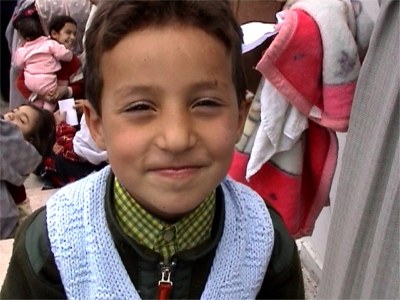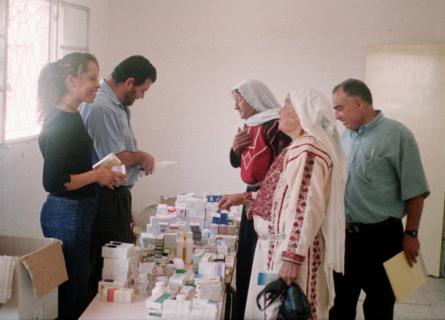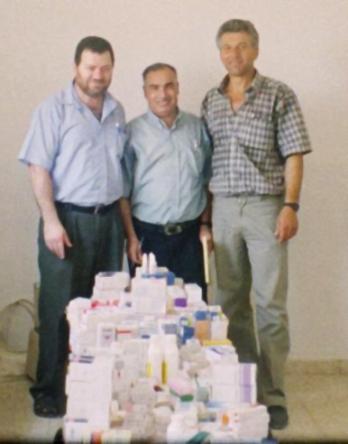Home > Oasis of Peace > Projects & Outreach > Humanitarian Aid > HAP report for Summer 2003
HAP report for Summer 2003
August 2003

July is a hot month in our area. The children are home from school and everything seems to move more slowly. But we can’t let this fool us: the humanitarian needs are overwhelming. The political situation has been changing slightly and we see a few improvements. Certain roadblocks have been removed near Ramallah, and some Palestinian doctors manage to travel to villages in the Ramallah district, which was impossible before. These slight changes are received on both sides with a healthy degree of skepticism, informed by the premature euphoria that followed the Oslo Accords.
The Humanitarian Aid committee is working in several directions this summer.
Malak Taisir
Malak is still in our care. She is home from hospital at the moment while awaiting further treatment on her leg. The deep scars, which cover most of her body, are treated with special bandages that place pressure upon them. These were contributed by the Jobst company in the USA and we thank all our friends in Michigan who made this connection possible. Plastic surgery is still not discussed by the doctors while their work on her leg remains unfinished. She has made great progress: she is walking and even riding a bicycle we managed to get to her. But she needs physiotherapy in order to maintain this progress and prevent a relapse. The hospital staff, who are very professional, recommended she go for physiotherapy three times a week. A girl in her condition surely needs such support. But conditions make it difficult to maintain that frequency. We will be more than satisfied if we manage to organize treatment for her once or twice a week. We thought of arranging treatment for her in NSWAS by physiotherapists who would volunteer. However, getting her here and back through the checkpoint would be a considerable operation and subject to the whims of the paramilitary border police who now man it. Their capacity for kindness and rational behavior is well known. So we decided that if were already making that effort it would be better to take her to the hospital. It’s a longer journey, but there is the advantage that she has come to know and trust the physiotherapists who perform this unpleasant treatment. The hospital has agreed to twice weekly sessions, at no additional charge, and we are working hard to schedule journeys with people from NSWAS.
On hearing of these complexities, a dear American friend wrote that it would be a great educational tool to document on the website the continuing effects of the Occupation upon Malak’s treatment: “It makes me angry to hear she is receiving less care than she needs due to these stupid problems.” I have to admit that I was shocked: Instead of being angry at a situation that deprives a child of proper treatment, I’d started to take it for granted and see what we can do under the circumstances, even if this is less than satisfactory.
Medical Treatment Day
This month we decided to conduct a medical treatment day in the village of Budrus. Like Media, which we have visited several times, this is a village near the town of Na’alin, not far from the Jewish city of Modi’in. It was the village council of Media who suggested that we should acquaint ourselves with Budrus. This is a village of 1,300, at the end of a long dirt road. Due to its remoteness and inaccessibility, there is a very high rate of unemployment and poverty there. Though a clinic was built by the Palestinian Authority, it remains empty and unequipped. There is a doctor living in the area, but he is young and inexperienced.

The treatment day was set for Saturday, August 2. The team included Adnan Manah, a pharmacist and field manager of the HAP committee. With him were Doctors Abdel Ra’uf Hijazi and Abdallah Haj-Yihya of NSWAS, Dr. Maher Diyab from Jerusalem, nurse Nuha Badawiyeh from Ramle, and Abdallah’s wife Souad Haj-Yihya, who went to assist. Together they treated 205 patients, who were primarily elderly people and young children. There were many patients with chronic conditions who could no longer afford their medicines. Some of these were diabetics, while others suffered from hypertension. Among children, the most common cases were infections due to poor hygiene. During the course of the morning two small girls were rushed in. One had an arm that had grown severely infected after an animal sting. The other had fallen and sustained a head injury. Fortunately Dr. Diyab, who had joined us for the first time, is a surgeon. He was able to perform procedures on these girls with local anesthetics. Who knows where they would have been dragged for treatment if he hadn’t been there.

The team met two women with cancer. They could receive treatment in Ramallah, but for this they need financial help. The team also saw a boy with growth problems who requires a very expensive growth hormone. We are considering helping these three people. On the treatment day itself the team distributed some $4,500 worth of medicines. The mayor of the village was extremely thankful, saying they had never been treated so professionally. He said that for the poor chronically ill patients free distribution of medicines was a life saving act. Afterwards he insisted that the team would stay for a meal. Everyone agreed we should visit the village for another medical treatment day. Meanwhile, we will be sending the medicines that were needed but missing from our mobile pharmacy. We also agreed that next time we would work closely with the local doctor. He was excited to cooperate and benefit from the high professionalism of the delegation.
Support for Nablus Summer Camp
HAP will contribute NIS 10,000 (€ 2,000)towards a summer camp for 500 children, organised by the Nablus Youth Federation. Participants in the camp are mainly refugees or children from poor families. Co-sponsors for the project are ANERA (American Near East Refugee Aid) and the European Community. Our contribution will provide meals during the program.

A Scholarship
We are seeking a high school graduate from one of the places on our treatment circuit: either Media, Na’alin or Budrus who would be interested to study nursing in the UNRWA seminary near Ramallah. The candidate would be from a family which could not otherwise afford to send her/him for study, and would promise to work in the village after graduating. The idea for such a scholarship came from the Media council head, who was trying to consider ways to empower the local community, rather than depending on professionals from the city.
Outfitting Clinics
The villages of Media and Budrus both have clinics that stand empty, with neither the means to measure blood pressure, nor a pad to write prescriptions. We will assess what is most needed and hopefully help them get organized.
Jahalin
East of Jerusalem lives a large Bedouin clan by the name of Jahalin. A few years ago, after a long legal struggle, the Israeli authorities forcibly evicted them from the encampment in which they had lived for the last 40
years, in order to expand Ma’ale Adomim, which was already the largest of the Jewish settlements in the West Bank. They were consigned to a barren hillside by a municipal garbage dump. They have a clinic, but no doctors. We have been asked to help, and a delegation from NSWAS will visit them to assess the situation.
A seminar
We are in the initial stages of planning a seminar in cooperation with the School for Peace for volunteers in the HAP project: doctors, nurses, pharmacists and others involved. The aim will be to examine our experience with the project till now and to look at options for the future. We would invite Palestinian NGO members to present feedback on assistance from Israel, and Palestinian health professionals to inform us more closely of the needs and conditions on their side.